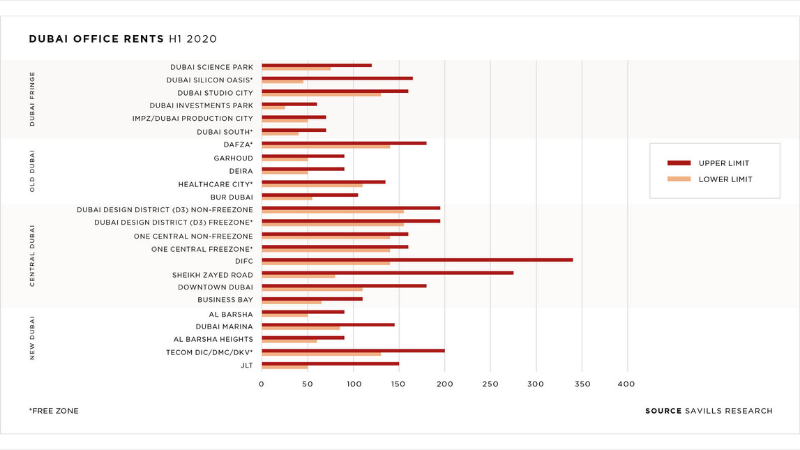Highlights
Savills: Dubai continues to lead the region as a preferred base for corporate occupiers across key sectors such as technology and life sciences

According to the latest Dubai Office Report from Savills, the leading global real estate advisors, leasing activity remained largely stable during the first half of 2020 despite strong headwinds caused by the COVID-19 pandemic. Similar to the last few years, the demand was driven by consolidation and space optimisation strategy by existing corporate occupiers in the city.
The pandemic has further accelerated this trend as companies try to rationalise their office space requirements in the wake of increased flexi-working including an extended work from home arrangement.

Paula Walshe, Director for International Corporate Services at Savills said: “The majority of enquiry levels and transactions during the first half of the year were for small and medium sized office space in the range of 5,000 sq. ft. – 15,000 sq. ft. However, a few large sized office transactions were concluded by global tech companies in H1 2020 as the city continues to lead the region as a preferred base for corporate occupiers across sectors. This was also evident from the other transaction closures during the first half of the year as clients from the financial services, technology, life sciences and manufacturing sector leased space across Grade A developments in Dubai.”
Walshe added: “Companies across most sectors have been impacted to some extent by the pandemic and a simultaneous fall in oil prices has put further strain on government finances and investments. As a result, most landlords have been working closely with tenants to help them through the challenging period. As most companies are still operating at reduced capacity and are anticipating their overall headcounts to reduce going forward, many landlords have been offering rental rebates and postponing rental collections to support companies with the much-needed cash flow.”
The market remains tenant favoured as landlords continue to offer flexible commercial terms including generous rent-free periods, additional car parking, lease flexibility through increased break opportunities with minimal penalties and even in limited cases upgraded space from shell and core to Category A fit-out (CAT A) as part of any new lease discussion. Their strategy and priority continue to be on securing and sustaining longer-term lease agreements.
Contrary to the sharp slowdown in domestic economic activity, due to the pandemic induced lockdown, the city continued to record exceptional growth in Foreign Direct Investments (FDI) during the first six months of 2020, with 190 projects worth AED 12 billion. This was reflected in the overall enquiry levels from new market entrants which has picked-up, especially from companies in the life science, media, technology and co-working space.
The long-term impact on demand for office space has been a key topic since the onset of Covid-19, with much written on both sides of the debate. To gauge occupier sentiments, Savills conducted a survey over the summer, to understand the long-term impact on office real estate. From Savills survey, 89% of respondents believe the office will remain a necessity for corporate organisations, with 47% believing this to be the case in the future, and 42% believing this to be the case at least in the short-term. The role of the office as a hub for in-person collaboration, innovation and the reinforcement of a company culture will carry more weight than before as it looks to differentiate between the home environment. The focus going forward will be to ensure the office is designed and managed to best serve the needs of the workforce.

Commenting on the sector, Swapnil Pillai, Associate Director Research Middle East at Savills said: “The sector is undergoing a structural change and this trend has been accelerated by the pandemic. There is an increased interplay between technology and real estate and a conscious focus of the health and wellbeing of employees. This has led to strong increase in demand for international quality developments which offer better building ventilation, increased security and connectivity and other add-ons such as advanced air filtration systems. Landlords have been reacting to this trend by focusing on refurbishing / upgrading their asset quality to improve value for existing tenants and making it more attractive to new occupiers.”
-

 Banking & Finance2 months ago
Banking & Finance2 months agoOman Oil Marketing Company Concludes Its Annual Health, Safety, Environment, and Quality Week, Reaffirming People and Safety as a Top Priority
-

 News2 months ago
News2 months agoJamal Ahmed Al Harthy Honoured as ‘Pioneer in Youth Empowerment through Education and Sport’ at CSR Summit & Awards 2025
-

 OER Magazines2 months ago
OER Magazines2 months agoOER, December 2025
-

 News2 months ago
News2 months agoAI Security Conference 2025 Hosted by Securado Highlights the Changing Cybersecurity Landscape
-

 Insurance1 month ago
Insurance1 month agoSupporting Community Wellness: Liva Insurance Sponsors Muscat Marathon 2026 with Free Health Checkups
-

 Interviews1 month ago
Interviews1 month agoEXCLUSIVE INTERVIEW: TLS Rebranding Marks Strategic Leap Toward Innovation, Sustainability & Growth
-

 Insurance1 month ago
Insurance1 month agoLiva Insurance Supports Community Wellness Through “Experience Oman – Muscat Marathon 2026”
-

 Investment2 weeks ago
Investment2 weeks agoLalan Inaugurates Its First Overseas Manufacturing Facility, Marking Sri Lanka’s First Investment in SOHAR Freezone





























